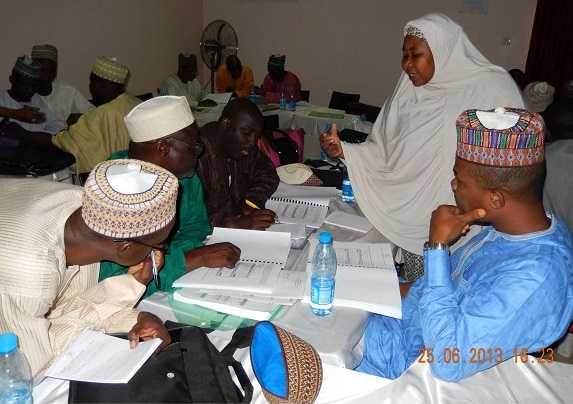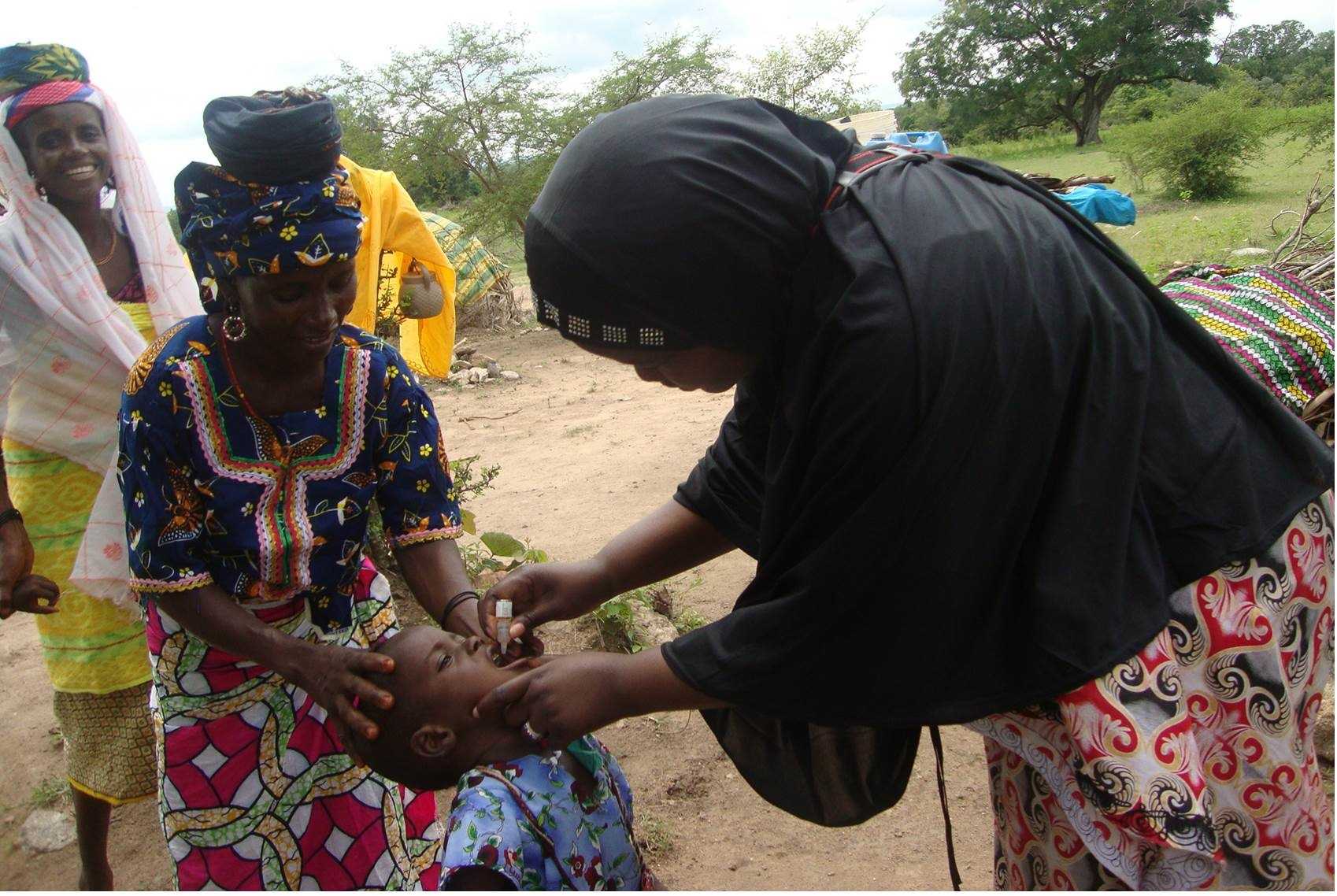Strength in Numbers: Nigeria & CDC Work to End Polio
The question seems so simple: How do you finish the job when success seems so close?
It’s being asked right now by public health officials in Nigeria, along with partners from CDC, as they endeavor to eliminate the last remaining cases of polio in one of the few places on earth where the disease still exists.
The question may be easy to ask. Answering the question is not. And that is the reason behind a new initiative called N-STOP. That’s short-hand for National Stop Transmission of Polio Program and it’s a key element in Nigeria’s effort to rid the country of a crippling disease.
N-STOP is a refined and specialized offspring of two larger programs that train disease detectives: the (international) STOP program and the Nigeria Field Epidemiology and Laboratory Training Program [PDF - 535KB] [1](N-FELTP). With help from CDC, participants in these programs learn critical public health skills such as how to conduct surveys to help answer important policy questions, how to detect and monitor trends in disease and how to interview people in the community to get a deeper and faster understanding of where disease is, how it is spreading, and how to stop it.
Those skills are now supporting the final push against polio. N-STOP officers receive additional training so they can plan vaccination campaigns that are critical to stopping polio. Just as critically, they also are trained to monitor for acute flaccid paralysis, a debilitating symptom that signals the presence of polio.
They also investigate polio outbreaks to better understand their root causes and to determine how to better respond in the future. Additionally, they reach out to populations outside of the public health system, including people in remote and nomadic settlements. Through these activities, N-STOP officers are part of the frontline force to detect and interrupt poliovirus transmission and strengthen immunization systems in Nigeria.
The reason for the effort is clear cut. Polio, a crippling disease that once affected thousands of children every year, is on the verge of being eradicated globally, an achievement that once realized will rank among the greatest public health victories in history.
But eradication means stopping every last case. It’s tantalizingly close. Only three countries remain where transmission of polio has never been stopped. Nigeria is one, along with Afghanistan and Pakistan.
This is why CDC along with Nigeria’s National Primary Health Care Development Agency (NPHCDA), the Federal Ministry of Health and Social Services, and the Nigeria Center for Disease Control created the N-STOP program in order to rid Nigeria of polio and improve the country’s immunization system.
CDC Contributes to a Novel Approach
A hallmark feature of the N-STOP program is its collaborative approach – CDC and other partners offer their expertise while recognizing that Nigerian health workers and officials are highly knowledgeable about their health system and the population it serves. A Nigerian health official shared that the program and the attitude surrounding it is appreciated. “Usually people [from international agencies] come to Nigeria to find fault, but with this initiative, you come with solutions and want to work together.”
Dr. Chima Ohuabunwo, the N-STOP program coordinator, states that with N-STOP, “We are boosting the public health workforce capacity in Nigeria in a way that is sustainable, and it is a good model that can be replicated for other health programs.” Dr. Ohuabunwo’s statement underscores an overarching goal of the N-STOP program: to create a sustainable, deployable, highly skilled public health workforce in Nigeria. Being one of the remaining countries where the spread of polio has never been stopped, it is critical that Nigeria be equipped to carry out the routine work involved in polio eradication as well as respond quickly to other public health emergencies.

CDC plays an integral role in building this workforce. One way is through our innovative training process. Trainees learn in a supportive environment, receiving a great deal of contact and supervision. Additionally, state primary healthcare teams and N-STOP officers train together, creating a sense of unity and camaraderie.
Dr. Hashim Elmousaad, a CDC contractor and internationally recognized immunization expert, believes that the applied training N-STOP officers receive is a particular strength of this program. Along with CDC’s Dr. Stacie Dunkle, he developed the training curriculum.
It’s comprehensive, including topics such as: routine immunization, immunization campaign management, and vaccine temperature management, a crucial and often under-appreciated element of a successful campaign.
Routine immunization at well-baby visits is the backbone of efforts to stop vaccine-preventable diseases, ensuring that all infants have access to life-saving vaccines. Immunization campaigns are conducted either to deliver routine vaccinations, or to offer a chance to “catch up” with missed doses. Management of these campaigns is a skill that must be learned. Finally, vaccines must be kept cold in order to maintain their efficacy and N-STOP trainees learn about optimal vaccine conditions and how to maintain these.
At each module’s training session, participants are given a six week field assignment to complete. At the following training session, participants and trainers review their field assignments, making for a highly valuable experience.
CDC is also contributing to the N-STOP program through our efforts to support the second objective of the Polio Eradication and Endgame Strategic Plan – strengthening immunization systems. However, in order to improve vaccination services, there must be data available. Crucial information must be gathered: How many children are not reached by immunization services? Where do these children reside? In order to answer these questions and more, Dr. Elmousaad is creating descriptive profiles of local government areas (LGAs), which are analogous to counties in the United States. In the spirit of building capacity among the Nigerian public health workforce, after completing several template profiles, he will transfer the task to LGA health workers so that they can foster ownership of the project and learn how the process works. Information from these profiles will lead to more children receiving all of their vaccines and receiving them on time, protecting them for life.
N-STOP Officers Making Progress
N-STOP initially started its work at the state level in 2012, when NSTOP officers were deployed to states that were either currently experiencing polio transmission or where the risk of an outbreak was high. Due to the popularity if the program, in 2013, additional N-STOP officers were hired to work in the 100 highest risk LGAs. Although the N-STOP program is relatively new, there have been several accomplishments already. In particular, there has been considerable progress in reaching out to underserved communities and learning where service gaps exist. Between August 2012 and July 2013, N-STOP officers conducted an on-foot census of LGAs and recorded over 5,100 remote settlements that had never been visited by vaccination teams. From this census information, they also documented over 1 million children amongst whom 63,000 had never been previously immunized against polio and they discovered evidence of prior polio transmission through the detection of 216 cases of acute flaccid paralysis (a surveillance indicator used to determine where polio has spread). Using the information gathered from their census efforts, in 2013 N-STOP officers provided vaccination services to remote settlements that are chronically missed during immunization drives. These accomplishments are in line with the second objective of the Polio Eradication and Endgame Strategic Plan: Detect and interrupt all poliovirus transmission.

N-STOP participants have also made significant inroads among diverse communities. They have conducted meetings with local leaders ahead of immunization campaigns in order to begin to build trusting relationships with community members. A testament to their progress is the huge demand for the program from states and LGAs that do not currently have N-STOP teams. Dr. Ohuabunwo describes N-STOP officers as “agents of change in their LGAs”, who are seen as “directly strengthening the existing health system with culturally appropriate technical teams.”
Another accomplishment of the N-STOP program is its use of data and research to drive policy. In 2013, NSTOP officers conducted operational research projects, including surveys of reasons why some families refuse or miss polio vaccine, evaluations of the new vaccinator training package and research into how to effectively reach out to nomads. The results of these research projects improve the effectiveness of the polio program.
Looking Toward the Future
Successful programs do not remain content with the status quo, and N-STOP is no different. There have certainly been achievements to celebrate, but CDC, the N-STOP team and Dr. Ohuabunwo would like to continue to build upon them. Future goals for the program include scaling up routine immunization support in LGAs that are still lacking access to regular immunization services, and expanding outreach to other states at high risk for polio circulation. Likewise, Dr. Elmousaad wishes to maintain the achievements made with routine immunization in 2013 as well as expand outreach activities and conduct research focusing on how to work with communities to encourage them not only to accept vaccines but to view them as an indispensable health service for their infants and children.
Ultimately, programs such as N-STOP are tackling the complexities of polio eradication efforts head-on. Through collaboration with Nigerian and other key partners CDC is helping to create a public health workforce in Nigeria capable of combatting polio and other vaccine preventable diseases so that children in Nigeria and beyond get the protection they deserve.
- Page last reviewed: March 4, 2014
- Page last updated: March 4, 2014
- Content source:
Global Health
Notice: Linking to a non-federal site does not constitute an endorsement by HHS, CDC or any of its employees of the sponsors or the information and products presented on the site.



 ShareCompartir
ShareCompartir